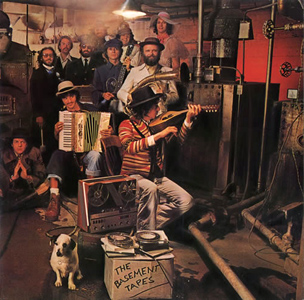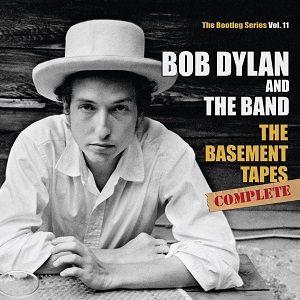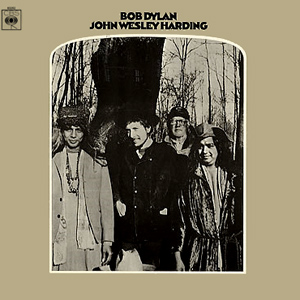My entryway into Bob Dylan was a weird one because it came as much through books as through music. Around the time I purchased the first part of the Bootleg Series for cheap at a going out of business sale I checked out the first edition of Clinton Heylin's Behind the Shades. I thus first read about Dylan's most important music before I ever heard it. I also picked up all the lore about the 1966 motorcycle accident, and understood it as this great transition point that made me less likely to listen to what came after.
The same happened years later the summer after I graduated from college. I needed money before leaving for grad school, so I took a summer job as a gas station clerk. By the point I was getting heavy into Dylan, and so I picked up Greil Marcus' Invisible Republic (nowadays titled The Old Weird America) when I saw it at the bookstore. I read that book mostly while on break at my job, or during the lulls in business late in the evening. The book is all about the Basement Tapes, and it intrigued me enough to go out and buy the 1975 version. The music made me realized that Dylan was up to a lot after the accident!
I fell in love with the music, and to this day it is my favorite thing to play on a lazy summer day. For Father's Day this year I finally bought the complete, official version. For a long time I had CD burns of a bootleg version. Ask your parents what a CD burn is. The Marcus book and the Basement Tapes also prompted me to go deeper in my interests in American roots music. I also acquired a CD burn of the Anthology of American Music and started digging things like Dock Boggs, Mississippi John Hurt, and Jimmie Rodgers.
This summer, coming after a year of hellish stress and death, the music has felt particularly apt. It's music coming from a man who's survived his own period of extreme stress and is wanting to just lay back and have a little fun with his friends. Don't we all want to do that right now?
In terms of albums, I am going to cover the two official releases of the Basement Tapes as well as John Wesley Harding, an album that grew out of Dylan's period of recovery. If you don't like my periodization, take it up with Greil Marcus, since he groups it that way too!
The Basement Tapes (1975)
In case you don't know the background, Bob Dylan crashed his motorcycle on the winding hilly roads where he was living in upstate New York in July of 1966. There are various tales of how bad he was hurt. It's important to note that he was nearing exhaustion from his schedule at the time, so the accident made it easier for him to cut back on touring commitments and get some rest. He was also newly married and had just become a father. I can say that life change will shift your priorities more than any motorcycle accident ever could.
While recovering he got together with the Hawks in the summer of 1967 (soon to be The Band) who backed him on his tour. They started recording some new songs (which were promoted to others to sing) as well as traditional songs, covers of pop songs, and some general screwing around. While they didn't always record in the basement, the name stuck. Some of the songs actually became hits for others. "Quinn the Eskimo" became "The Might Quinn" for Manfred Mann and the Byrds recorded a couple of them for their influential Sweetheart of the Rodeo album. Some of the songs were bootlegged in the late sixties, then a selection of them were finally officially released (along with some Band recordings not from these sessions) in 1975.
While the songs sound raw compared to studio recordings of the time, there are apparently overdubs aplenty on this release. Once I was able to hear the originals that became clear to me. However, since this is how I first encountered this music, I have a hard time hearing the "real" versions and getting them to replace the image of the song in my mind from the 1975 recordings. Maybe authenticity is overrated.
If you can remove these questions from your mind, this is still very much listening to in 2021 with the "original" version now available. Some of the songs are The Band without Dylan, and despite that are pretty great. "Long Distance Operator," a funky blues, is especially good.
Rating: Five Bobs
The Bootleg Series Vol. 11: The Basement Tapes Complete (recorded 1967)
As I mentioned before, this was my decadent Father's Day present to myself and has been completely worth it. I can now hear the full range of the universe Dylan and the Band were constructing in the basement. The basement is a great metaphor, since in 1967 as the hippy thing was bursting forth and psychedelic music ruled the airwaves, Dylan had decided to call on the vast reservoirs of American roots music derived from life in the country. I love to put this music on and just let it take me to the alternate universe it constructs. I also just love the goofing off and screwing around. "See You Later Allen Ginsburg" isn't much of a song, but it's a lot of fun.
It's striking how much bootlegs of this music impacted the broader music scene, a kind of underground message. Some of it came aboveground when The Band put out their first album in 1968, which supposedly moved Eric Clapton to disband Cream because the Band's rootsier grounding seemed to make psychedelia look silly. Within a year of Sgt Pepper, which had supposedly "changed everything," rock bands were retreating from its elaborate trappings. By 1969 even the Beatles realized it was time to "Get Back" to the roots.
Maybe my love of this music comes from having grown up in a rural area myself. There is something strange and powerful in a languid hot summer day in an isolated small town. You can feel both completely peaceful and restlessly bored at the same time. I look forward to going home in a couple weeks to experience it again.
Rating: Five Bobs
John Wesley Harding (1967)
This has got to be one of the most unique albums in Dylan's catalog. He is playing guitar and harmonica with spare backing, which might be a return to the folkie days, but it doesn't quite sound the same. The songs are structured to be one verse after the other, with nary a chorus to be found. The themes are deep, literary, and metaphorical. They don't sound at all like the Basement Tapes songs, but certainly reflect the "back to basics" approach of that time. While I like many of the songs on this album, I have never been able to totally penetrate it. The music styles of the songs get a little sames-y, so that might be the reason why. It's still worth listening to, especially the lyrics.
The last song, "I'll Be Your Baby Tonight," lights the way to what's coming with Nashville Skyline.
Rating: Four Bobs



No comments:
Post a Comment